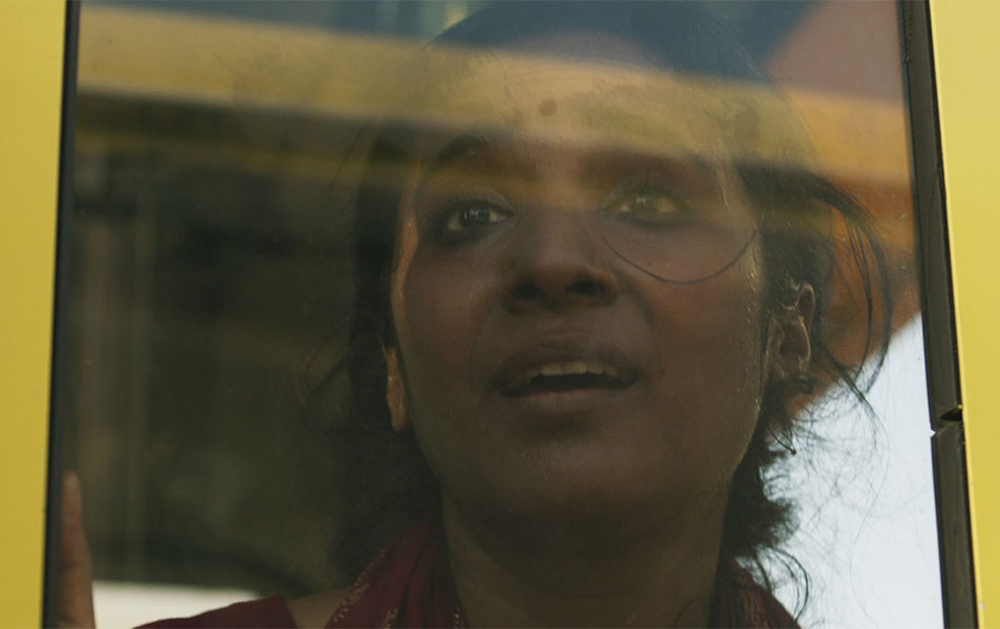Writer/director Wendy Bednarz takes note of the changing architecture in the Arabian Peninsula in the opening moments of “Yellow Bus,” cross-cutting scenes of towering, shimmering skyscrapers with as-yet-to-be-developed parts of the city where buildings are two stories at most. The old and new ways of doing things are reflected in the architectural design, but to undertake such massive projects, it’s embedded into the construction of them as well when the developments requires an influx of immigrants for whom there is the promise of making a living, but not necessarily a life when the city remains foreign. The filmmaker doesn’t linger on these images for long, but they stay in your head as her absorbing debut feature unfolds, detailing a tragedy that somehow begets an even greater one when an Indian family, whose patriarch has come to work in the country, learns their youngest daughter Anju (Kshethra Mithun) has died after falling asleep inside a hot school bus and her mother Ananda (Tannishtha Chatterjee) believes closure can only be found by knowing everything that happened the day of the incident.
The audience is privy to this information well before Ananda is, which makes “Yellow Bus” unusual in finding tension elsewhere – and plenty of it as Ananda starts conducting her own investigation after local authorities rule the death an accident. There’s no reason to disagree with their assessment from what’s shown by Bednarz, though there’s any number of small, seemingly insignificant occurrences that everyone who crossed paths with Anju on her way to school can now feel unduly guilty for, from the bus attendant (Jennifer Dabu Lara) who doesn’t go all the way to the back before stepping off to Anju’s older sister Ravina (Aarushi Laud), who rushed off to class assuming that her sister would leave after everyone else did. While Ananda is angry at everyone without having the full picture for herself, she becomes fixated on the bus door, which had a tendency to jam and should’ve likely been replaced by the Al-Ameer Academy, the female-run institution that is a point of pride among the locals when it represents progress., though as Ananda learns when its headmistress (Kinda Alloush) tries to settle the case with a few Manila envelopes full of cash, beholden to certain old ways of handling such sensitive issues.
A propulsive drama starts to take shape watching all involved make the wrong moves for the right reasons. Although Anju’s death deserves to be mourned, the film observes that no one has the time to when consumed with their own rage towards one another, with no way to either grieve or seek resolution when every exchange ends up aggravating the situation further. “Yellow Bus” not only explores the cultural differences that exacerbate the issues at hand, but ones that exist within families themselves when at school, Ravina feels more comfortable speaking to the headmistress than her mother after feeling somewhat responsible for Anju’s death, which is welcome by the headmistress not as some trump card over Ananda, but a tonic for the lack of communication she has with her own daughter.
Bednarz, with “Blue is the Warmest Color” cinematographer Sofian El Fani, will occasionally take ordinary scenes into a slightly surreal and eerie realm, envisioning for instance the phalanx of buses in the school parking lot that Ananda searches through for the one her daughter died in as a maze with no way out. But more impressive is how she is able to pull this feeling off from scene to scene as the situation spirals out of control and characters act irrationally only because of how they’re relating to one another. “Yellow Bus” may raise some questions about the foundation on which this modern-day society is built, but its own nuts and bolts are quite sturdy and proves to be seriously strong stuff.
“Yellow Bus” will screen again at the Toronto Film Festival on September 12th at 6 pm at the Scotiabank 13.




